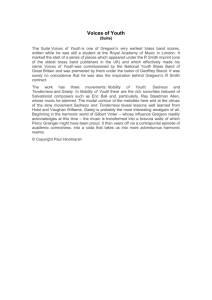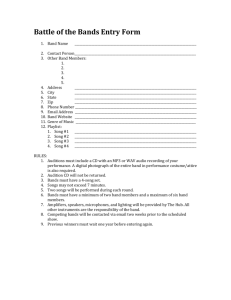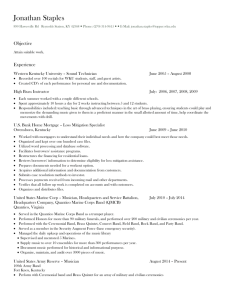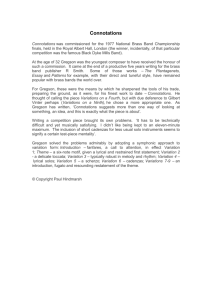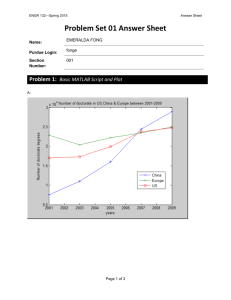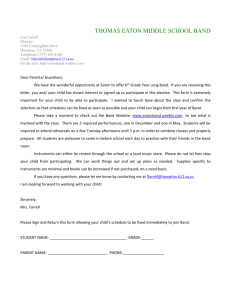Presentation by Paul Hindmarsh
advertisement
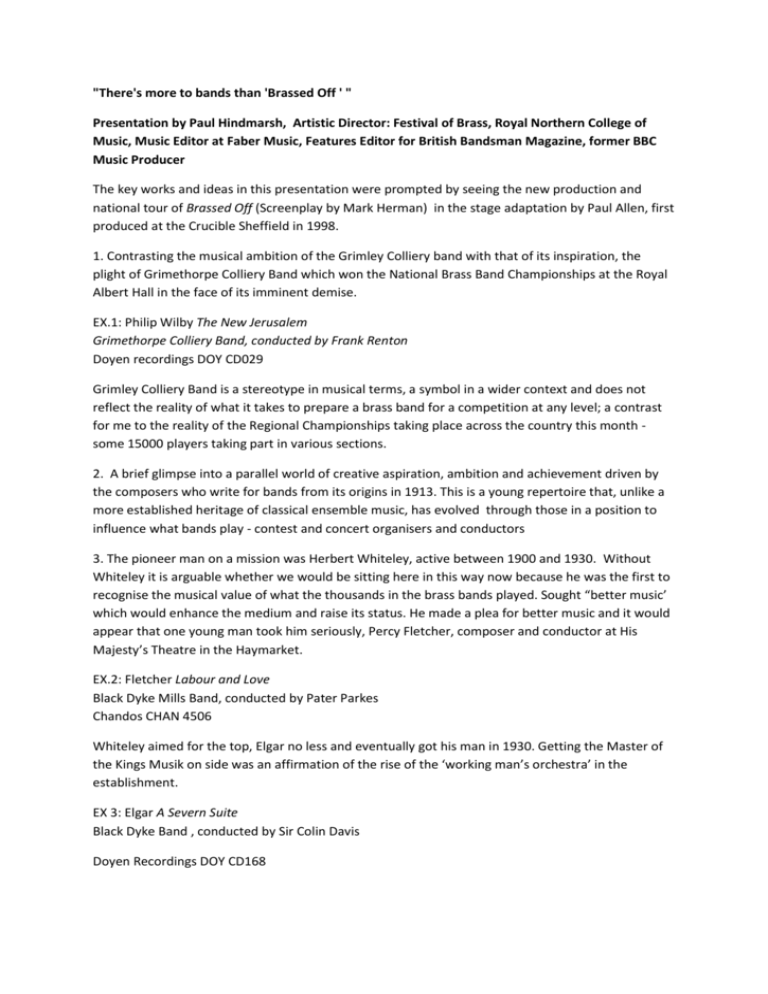
"There's more to bands than 'Brassed Off ' " Presentation by Paul Hindmarsh, Artistic Director: Festival of Brass, Royal Northern College of Music, Music Editor at Faber Music, Features Editor for British Bandsman Magazine, former BBC Music Producer The key works and ideas in this presentation were prompted by seeing the new production and national tour of Brassed Off (Screenplay by Mark Herman) in the stage adaptation by Paul Allen, first produced at the Crucible Sheffield in 1998. 1. Contrasting the musical ambition of the Grimley Colliery band with that of its inspiration, the plight of Grimethorpe Colliery Band which won the National Brass Band Championships at the Royal Albert Hall in the face of its imminent demise. EX.1: Philip Wilby The New Jerusalem Grimethorpe Colliery Band, conducted by Frank Renton Doyen recordings DOY CD029 Grimley Colliery Band is a stereotype in musical terms, a symbol in a wider context and does not reflect the reality of what it takes to prepare a brass band for a competition at any level; a contrast for me to the reality of the Regional Championships taking place across the country this month some 15000 players taking part in various sections. 2. A brief glimpse into a parallel world of creative aspiration, ambition and achievement driven by the composers who write for bands from its origins in 1913. This is a young repertoire that, unlike a more established heritage of classical ensemble music, has evolved through those in a position to influence what bands play - contest and concert organisers and conductors 3. The pioneer man on a mission was Herbert Whiteley, active between 1900 and 1930. Without Whiteley it is arguable whether we would be sitting here in this way now because he was the first to recognise the musical value of what the thousands in the brass bands played. Sought “better music’ which would enhance the medium and raise its status. He made a plea for better music and it would appear that one young man took him seriously, Percy Fletcher, composer and conductor at His Majesty’s Theatre in the Haymarket. EX.2: Fletcher Labour and Love Black Dyke Mills Band, conducted by Pater Parkes Chandos CHAN 4506 Whiteley aimed for the top, Elgar no less and eventually got his man in 1930. Getting the Master of the Kings Musik on side was an affirmation of the rise of the ‘working man’s orchestra’ in the establishment. EX 3: Elgar A Severn Suite Black Dyke Band , conducted by Sir Colin Davis Doyen Recordings DOY CD168 4. Where Elgar went others were encouraged to follow and the 1930s saw the trickle of original music begin to expand into a significant repertoire. The 1930s and 40s also saw the rise of the specialist composers and arrangers and without their contribution right up to the present the brass band movement would certainly not have moved in musical terms. Like Elgar and many band members, they were mainly from the working families and largely self-taught Two contrasting examples from the Salvation Army background Eric Ball (1903 - 89) - sStill the most admired composer among the older generation. He described his music as old fashioned, but it chimes still with the taste of the amateur band person in its romantic language and it does fill a gap in original music that the band movement doesn’t have. His best known work - with a spiritual core (as so much of his music) was a 1950 tone poem Resurgam - I shall rise again EX.4: Ball Resurgam Grimethorpe Colliery Band conducted by Elgar Howarth Doyen Recordings DOY CD108 Wilfred Heaton (1918 - 2000) An intriguing exemplar of the self-taught ambition for improvement from the working family. Left school at 14, and eventually became a brass instrument repairer and subsequently a teacher. He wrote at the cutting edge for bands and his music didn’t make much headway outside the SA until the 1980s, yet he had largely stopped composing in the 1950s. What was being heard for the first time and challenging audiences in the 80s was already 40 years old in some instances. Contest Music , based on 1950s material and composed in 1973/4 has become one of the most admired and influential test pieces of the 20th century. EX.5: Heaton Contest Music Grimethorpe Colliery conducted by Elgar Howarth Doyen Recordings DOY CD163 Heaton’s music is a special interest of mine - and so many of the next generation of composer were influenced by this piece. 5. Next man on a mission is Geoffrey Brand (b. 1926) As BBC Producer encourages Gilbert Vinter (1909 - 1969) to write for brass bands. As owner of national Championships, British bandsman and R Smith (Henry Iles and Whiteley combined!) commissioned Heaton and also Malcolm Arnold to write for the competition but crucially, took the concert repertoire onto a new level with the very first important full concertos for brass - Cornet Concerto by Ernest Tomlinson and Euphonium concerto by Joseph Horovitz. Vinter brought a splash of new colour and vibrancy to the brass band sound, transforming the sound of the brass band with music like this….. EX: 6 Vinter Spectrum Williams Fairey Band conducted by Peter Parkes Polyphonic QPYL058D 6. Elgar Howarth (b. 1935) and modernism Talking of dark ness. This is another view of the dark satanic mills from 1974 - away from the symphonic style world to modernism. EX:7 Harrison Birtwistle Grimethorpe Aria Grimethorpe Colliery Band conducted by Elgar Howarth Doyen recordings DOT CD165 (remastered from DECCA PL , 1977) Without EH’s vision and the music he commissioned, brass bands would never have appeared at the Proms and at major creative music festivals up and down the land. This was an enormously important time because it brought into the brass band movement a wave of new creative voices, and the shock waves are still resounding. 7. Next ‘man on a mission’ is Philip Wilby, who was for most of his career professor of composition at Leeds University, Early on in his journey with bands he encountered much resistance from his peers and colleagues, who suggested he might like to move to the ethic music department if he was going to continue down this path. Over the past 20 years, Wilby has done more to promote a school of brass band composition than most. He has also sought to bridge the musical chasm between the expectations of brass band audiences and the creative ambitions of the band composers. When I was looking for pieces and composer who could extend boundaries, but without alienating the brass band community by providing music too much outside their understanding… EX: 8 Wilby Paganini Variations Grimethorpe Colliery conducted by Frank Renton Doyen recordings DOY CD029 8. The current creative landscape. Over the past 20 years as the notion of there self-taught, working man made good concept has fallen away with the demise of the works bands, but now that gap has been filled with brass band course and bands at a number of conservatoires - Manchester, Cardiff, Birmingham, Glasgow - and at Salford and Huddersfield universities. Salford was the first to add a bespoke brass band degree, inspired by another self-made musician of great pedigree Dr. Roy Newsome. Next month the British Army launches three brass bands - so now the amateur movement has a professional arm and a career path for some of the unfashionable instruments. But I am particularly proud of being able to bring in forward a new generation of writers and confirm the reputation of established ones through BBC and now RNCM Festival of Brass Composers to look out for, all with British Composer Awards or nominations Simon Dobson Gavin Higgins Lucy Pankhurst Nigel Clarke Examples of current work: EX: 9 Edward Gregson Symphony in Two Movements commissioned jointly by NYBBGB and NYBBW demonstrating impact of these organisations, the former appearing successfully at the Proms in 2012. Live recording of first performance by NYBBGB conducted by Bramwell Tovey EX: 10 Nigel Clarke Mysteries of the Horizon - recipient of the latest BCA for his cornet concerto first performance at 2013 RNCM Festival of Brass. Harmen Vanhoorne (cornet), Brass Band Buizingen (Brussels), conduced by Luv vertommen, BBB 88931-2 EX: 11 James MacMillan Canite Tuba (Sound the trumpet): Top UK composer commissioned by Black Dyke Band in 2009, premiere of full version at 2013 RNCM Festival of Brass. Live recording.
